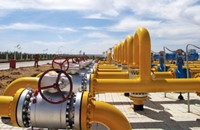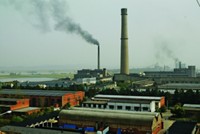Advertisement
Grab your lab coat. Let's get started
Welcome!
Welcome!
Create an account below to get 6 C&EN articles per month, receive newsletters and more - all free.
It seems this is your first time logging in online. Please enter the following information to continue.
As an ACS member you automatically get access to this site. All we need is few more details to create your reading experience.
Not you? Sign in with a different account.
Not you? Sign in with a different account.
ERROR 1
ERROR 1
ERROR 2
ERROR 2
ERROR 2
ERROR 2
ERROR 2
Password and Confirm password must match.
If you have an ACS member number, please enter it here so we can link this account to your membership. (optional)
ERROR 2
ACS values your privacy. By submitting your information, you are gaining access to C&EN and subscribing to our weekly newsletter. We use the information you provide to make your reading experience better, and we will never sell your data to third party members.
Business
Brine Into Gold
Chinese bromine producer generates high profits from its mining licenses
by Jean-François Tremblay
July 26, 2010
| A version of this story appeared in
Volume 88, Issue 30

Gulf Resources’ main assets are a 40-minute drive from the city of Shouguang in China’s Shandong province. On flat and mostly arid land are brine-rich evaporation ponds that extend almost as far as the eye can see. The producer of bromine derivatives and bromine-based chemicals controls about 35 sq miles of China’s best bromine deposits. For Gulf, it’s like a license to print money.
Extracted from brine, bromine finds its way into chemicals used in oil and gas drilling, flame retardants, agrochemicals, and pharmaceuticals. “We have the best reserves in China,” says Xiaobin Liu, Gulf’s chief executive officer. “As long as we operate smoothly, pay our taxes, and perform well in terms of safety, health, and environmental issues, we’re going to keep our licenses.”
Young and highly profitable, Gulf converted more than a quarter of its $110 million in sales last year into net profit. It’s growing fast by acquiring its competitors, expanding its product range, and capitalizing on rising bromine prices in China.
China accounts for 30% of the world market for bromine and its derivatives, Liu estimates, noting that many of the brominated compounds sold in China find their way into products that are exported. The Chinese market grew 5% last year and will likely expand by 10% in 2010 as the world economy rebounds, he figures.
Within China, Gulf’s position is strong. Liu reckons it enjoys a 23% share of the national market, a larger share than any other company. Foreign producers—mostly from Israel and the U.S.—are bigger, but together they control only 18% of the Chinese market.
Gulf Resources At A Glance
Headquarters: Shouguang, Shandong
province, China
Sales: $110 million
Net earnings: $31 million
R&D spending: $500,000
Employees: 700
BUSINESSES (% of total sales):
Bromine and crude salts (67%): flame retardants, water purification, fumigation, pharmaceuticals, and disinfectants
Chemicals (33%): oil and gas field development, water treatment, and pulp and paper processing
Website: www.gulfresourcesinc.cn
Although the concentration of bromine is higher in Israeli and U.S. brines, Chinese producers compensate with their lower labor costs and access to cheaper electricity, Liu says. “We’re not directly competing against foreign firms, because we don’t make flame retardants,” he adds.
In contrast, Albemarle, the biggest U.S. maker of bromine derivatives, is a major flame-retardant producer. Sharon McGee, the company’s vice president for performance chemicals, says China is “clearly an attractive market for Albemarle.” Albemarle competes there by offering bromine derivatives that are “unique to Albemarle,” she says, particularly flame retardants used by the electronics industry. In addition, Albemarle tries to position itself as a reliable supplier. Several Chinese companies idled production this year because of rising production costs, McGee notes.
A recent research report on Gulf by the brokerage firm Oppenheimer notes that the Chinese government stopped issuing new bromine production licenses in 2006 and has been shutting down unlicensed facilities. The government is tightly regulating production, the report says, because “excessive exploration has caused China’s bromine reserves to decrease both in quantity and concentration.”
In response to dwindling reserves and rising demand, Gulf has been expanding its bromine capacity by acquiring competitors around Shouguang. It now owns nine plants, with a total capacity of 46,000 metric tons. Over the past three years, Oppenheimer estimates, Gulf has more than tripled its capacity through acquisitions. The company employs a stable workforce of 700 people who are native to the region.
Gulf was launched in 2005 by Ming Yang. Now the firm’s chairman, Yang had been a government official regulating the natural gas industry until 1997. His familiarity with the government was important in obtaining the bromine business licenses that are so critical to Gulf’s success. “You need a lot of government support in this business,” he says.
In 2009, Gulf listed on the NASDAQ stock exchange in the U.S. to finance its growth. Listing is easier in the U.S. than in China, Liu explains. “In the U.S., you can list as soon as you meet all regulatory requirements, whereas in China there are long delays even when you’re fully compliant.” Although U.S. investors have a reputation for being fickle, they actually think longer term than their Chinese counterparts, Liu says, making for a less volatile stock price.
One of Gulf’s main thrusts at present is to develop new and higher value products for oil and gas exploration, and for the pharmaceutical, agrochemical, and water treatment industries. Last month, Liu points out, Gulf started operating a new plant making water treatment additives.
The company spends a mere $500,000 annually on R&D, but that’s a misleading figure. Although Gulf recently opened a 20-person R&D center, most of the real research is actually performed by several Chinese universities that Gulf cooperates with. Liu says the R&D facility exists mostly to scale up the products the universities develop for manufacturing.
China’s bromine industry is in decline overall, according to Albemarle’s McGee, who says output this year will be less than that in 2009, mostly because of overexploitation. Gulf is fighting against that trend. “Big companies are better at managing safety, health, and environment,” Liu says. “We want to expand, and the government encourages smaller operators to sell out.”








Join the conversation
Contact the reporter
Submit a Letter to the Editor for publication
Engage with us on Twitter